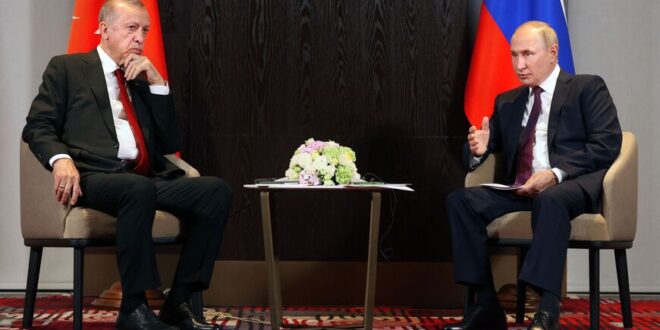Revival of the vital grain deal will top the agenda of the Turkish and Russian presidents in Sochi, but experts believe Moscow’s quick return to the agreement is unlikely.
Turkey’s President Recep Tayyip Erdogan will travel to Sochi next week for a highly anticipated meeting with Russian President Vladimir Putin, as Ankara speeds up its efforts to revive a key Black Sea deal that allowed Ukrainian grain to reach world markets.
In televised remarks on Monday, ruling Justice and Development Party spokesperson Omer Celik voiced hope that Erdogan’s visit would yield positive developments on the currently defunct Black Sea grain deal that allowed Ukraine’s foodstuff, particularly its grain, to reach world markets.
“He will pay a visit to Sochi in the upcoming days. We think that there will be new developments following this visit,” Celik told journalists, adding that the visit could lead to a new stage in efforts to revive the deal.
Celik didn’t provide a timeline for the visit, but Russian state media reported last week that the meeting would take place next Monday.
The visit comes as Ankara has been speeding up its efforts to convince Russia to return to the deal amid intensifying clashes in the Black Sea between Ukraine and Russia. Following its refusal to extend the deal after it expired on July 17, Russia began striking Ukraine’s ports and storage facilities on the Black Sea coast, prompting counter-strikes by Ukraine.
Turkey’s Foreign Minister Hakan Fidan, who visited Ukraine last week, is also expected to meet with his Russian counterpart Sergey Lavrov soon to discuss the issue, the Russian Foreign Ministry separately announced Monday.
Following Fidan’s meetings with Ukrainian President Volodymyr Zelenskyy and his counterpart, Dmytro Kuleba, as well as other high-level Ukrainian officials in Ukraine, the top Turkish diplomat reiterated his country’s position, distancing Ankara from Western- and Kyiv-led efforts to set up an alternative route for Ukrainian shipments without Russia’s involvement.
“We cannot possibly approve of the destruction or bombing of ports and tools that are key instruments for the transport of grain. For this very reason, we, from the onset, thought that Russia should return into the equation,” Fidan told journalists on Friday while speaking alongside Kuleba. “We anticipated that we would face such scenes in any solution or alternative that doesn’t involve Russia.”
Kuleba, for his part, said that they believed the alternative route could be successful, but he added that the revival of the original deal was also an optimal solution for them.
Amid ongoing clashes between the warring parties, the second Ukrainian cargo ship to challenge the Russian blockade in the Black Sea since Russia’s withdrawal from the deal reached Turkish seas on Monday after leaving a Ukrainian port on Saturday.
The Black Sea grain deal was brokered by Turkey and the United Nations last year after the Russian invasion of Ukraine — which is known as the world’s breadbasket — halted Ukrainian foodstuff, particularly grain exports, leading to dire warnings of a global food crisis and even famine.
Russia has cited Western sanctions when explaining its reluctance to extend the deal, arguing that blocking Russian banks from using the international payment system, SWIFT, and insurance-related sanctions were effectively obstructing Russian food and fertilizer exports from reaching world markets.
Western capitals, in turn, maintain that the sanctions do not target Russian food and fertilizer exports. Accusing Russia of weaponizing grain, European Commission Executive Vice President Valdis Dombrovskis called on Russia to return to the deal on Saturday while speaking on the sidelines of the G-20 Trade Ministers’ Summit in New Delhi, India.
Next week’s meeting will mark the first face-to-face meeting between the Turkish and Russian leaders since Erdogan’s reelection in May. Previously, Erdogan had said that Putin would travel to Turkey in August, but the visit didn’t take place. Turkish officials haven’t provided any clarification on the rescheduling.
If Russia acquiesces to the deal following the meeting, it would embolden Turkey’s efforts to position itself as an actor that can talk to both sides in the war through its self-proclaimed “proactive neutrality.” Ankara sealed off its Dardanelles and Bosporus straits to Russian warships and continues sending military supplies to Ukraine, but didn’t join Western sanctions against Russia.
“It is a key example of the role that he wants Turkey to play in the world, namely that of a powerful country that can say it has friends on all sides that it can influence,” Nicholas Heras of the New Lines Institute for Strategy and Policy told Al-Monitor.
Yet Erdogan faces an uphill task this time, Heras cautioned, saying that Putin wouldn’t give his nod to any new deal unless Russia gains something in return.
“This is a tough task for the Turkish president because Putin is trying to turn the war in Ukraine into a decisive victory,” Heras opined. “Essentially, Putin is going to push Erdogan to be ‘Eurasian’ and not ‘NATO’ in Turkey’s approach before agreeing to a new grain deal.”
Maxim Suchkov, associate professor at the Moscow State Institute of International Relations and a senior nonresident fellow at the Middle East Institute, echoed this pessimism at prospects for reviving a deal, pointing to Russian domestic opposition to such a move.
“In my view, that the two are taking their time to meet means the grain deal is unlikely to be revived at this stage,” Suchkov told Al-Monitor. “There’s a million external reasons why Moscow isn’t willing to get back to it and a strong domestic opposition to its revival — many view it a sign of weakness in the face of Western pressure and ultimately a bad deal for Russia.”
 Eurasia Press & News
Eurasia Press & News



